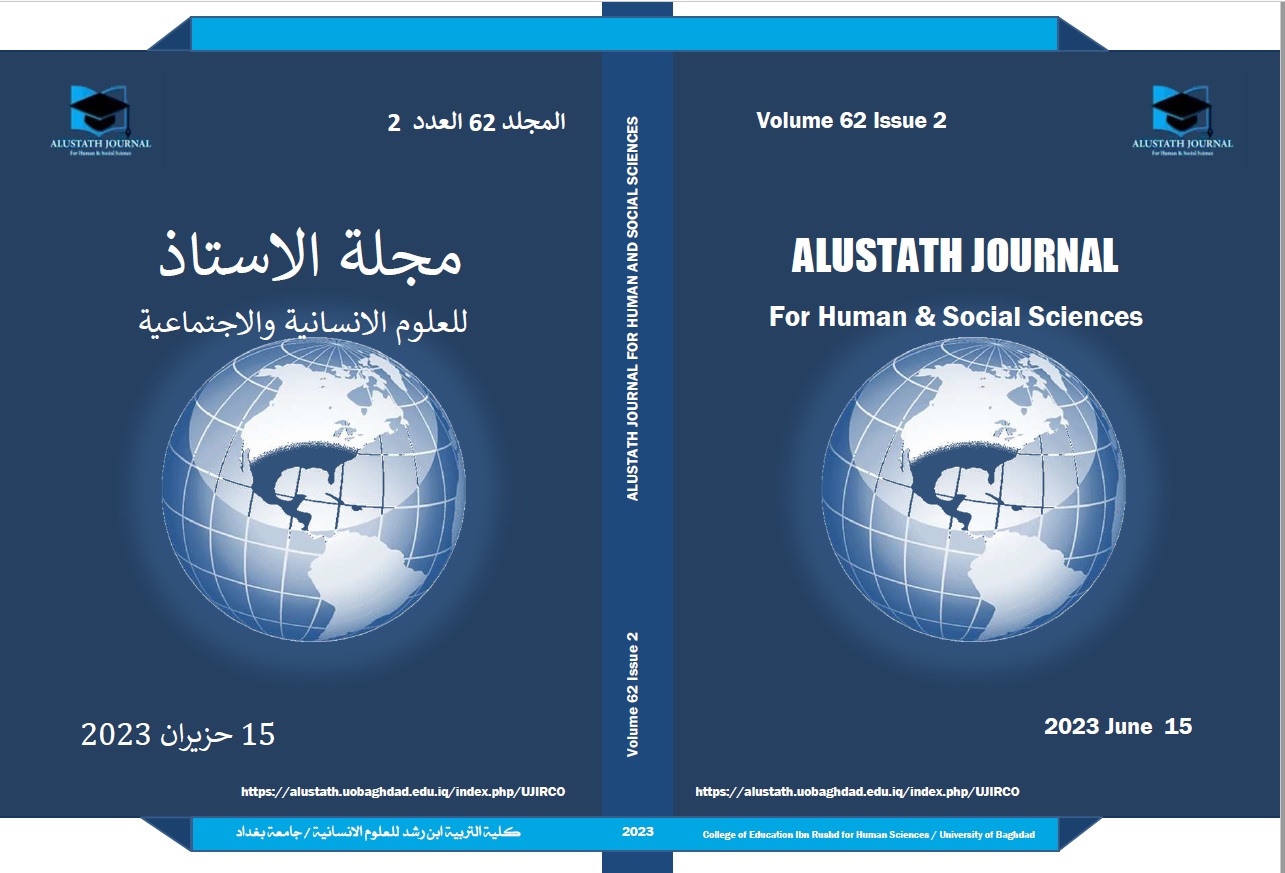Artistic Construction and Rhetorical Styles in the Poem of the Catastrophe of Damascus by Ahmad Shawqi
DOI:
https://doi.org/10.36473/ujhss.v62i2.2062Keywords:
artistic construction, rhetorical methods, Shawqi, Nakba DamascusAbstract
Ahmad Shawqi led his words and his letters reigned as Persians to her knight, he was crowned King, and he was crowned Emir. The tribe was Arab if a poet came to congratulate the tribes, because it was the protection of their symptoms, immortalization of their monuments, mention of them, and they congratulated only a boy born, a poet who grew, or a horse who produced "known for his patriotic attitudes that affected him. His homeland carried a bleeding wound and wounded his pen with a patter sword. He was fined in Damascus and fiancée and ha. He was the fiancée's yes in her grief, her unity and her struggle against her enemies, who desecrated her soil and excelled. He stood in the wall of Azbakiyah in 1926 on an occasion dedicated to helping the people of Syria after their land was bombed and destroyed. He created his poem "Damascus Nakba", in which his feelings were manifested by genuine sincerity, the monolith of powerful meanings, without cost, live, beautiful, expressive by rhetorical artistic methods, and a university between news and creation. . The results of the study are: The poem “The Nakba of Damascus” is a poem full of patriotic and national meanings, through which we discover the true personality of the Prince of Poets, and hi national concern. Likewise, the poem “The Nakba of Damascus” is considered a true historical document through which it embodies the history of Syria and transmits it faithfully, with its honorable, distant past – and the painful relative, who embodied the Nakba in all its forms from the greed of the invaders and the pity of the French, as well as the courage and strength of its people.
Downloads
References
• The Holy Quran / Ottoman painting / calligrapher Othman Taha. Al-Sharbaji Press Library for Printing and Publishing, Damascus Al-Halbouni.
• Abu Kreisha, Taha Mustafa 1998. The Balance of Poetry at Al-Akkad, 1st Edition, Cairo, Dar Al-Fikr Al-Arabi.
• Aristotle Thales 2000. The Art of Poetry, translated by Dr. Ibrahim Hamada, Egypt, Anglo-Egyptian Bookshop.
• Ismail, Ezzedine 2007. Contemporary Arabic poetry, its issues and its artistic and moral phenomena, Beirut, Dar Al-Awda.
• Al-Jurjani, Abdel-Qaher 2001. Secrets of Rhetoric in the Science of Rhetoric, investigation, d. Abd al-Hamid Hindawi, Beirut, Dar al-Kutub al-Ilmiyyah, first edition.
• Al-Jurjani, Abdel-Qaher 2008. Signs of Miracles, Investigator: Mahmoud Muhammad Shaker Abu Fahr. Publisher: Al-Khanji Library, Al-Madani Press.
• Al-Dainouri, Ibn Qutayba 1982. Poetry and Poets, Part 1, investigator: Ahmed Muhammad Shaker; Ahmed bin Muhammad Shaker bin Ahmed bin Abdul Qadir, publisher: Dar Al-Maaref.
• Al-Razi, Muhammad bin Abi Bakr Abdul Qadir 1865. Mukhtar Al-Sahah, Al-Nouri Foundation.
• Al-Zarkali, Khair Al-Din 2002. Al-Alam, Al-Mubta' Al-Arabiya, Part 1. Dar Al-Ilm for Millions Edition: Fifteenth.
• Shawky, Ahmed 2020. Diwan Ahmed Shawky, Al-Taqwa for Publishing and Distribution, Egypt.
• Guest, d. Shawky 2010. Shawky, Poet of the Modern Age, 1st Edition, Egypt, the Egyptian General Book Organization.
• Al-Akoub, D. Issa Ali 2000. Al-Mufassal in the Sciences of Arabic Rhetoric (Al-Ma’ani, Al-Bayan, Al-Badi’), Aleppo, Aleppo University Publications.
• Al-Akkad, Abbas Mahmoud and Al-Mazni, Ibrahim Abdel-Qader 2018. The Court in Literature and Criticism, Part 1, Hindawi Foundation.
• Al-Alawi, Ibn Tabataba 2005. Caliber of Poetry, Abbas Abdel Sater - Naim Zarzour, Publisher: Dar Al-Kutub Al-Alami.
• Farid, d. Maher Shafiq 2000. Introduction to the Diwan book, The Diwan in Literature and Criticism a. Abbas Mahmoud Al-Akkad, a. Ibrahim Al-Mazni - Presented by Dr. Maher Shafiq Farid, 1st edition, the General Book Authority.
• Fadl, Salah 1980. Theory of Constructivism in Literary Criticism, Egypt, Anglo Egyptian Bookshop.
• Qudamah bin Jaafar 2006. Criticism of poetry, investigation by Dr. Muhammad Abdel Moneim Khafaji, Beirut, Scientific Books House.
• Al-Qayrawani, Ibn Rasheeq 1990. Al-Omdah in the beauties of poetry, its literature and its criticism, part 1, investigated by Muhammad Abdel-Qader Ahmed Atta, Lebanon, Dar Al-Kutub Al-Ilmiya, Beirut.
• Mahmoud, Abdel Basset 2009. The most important principles of Akkad between theory and practice, Amman, Dar Taibah, vol. 1.
• Mandour, d. Muhammad 1997. Criticism and Contemporary Critics, 1st Edition, Egypt, Nahdhat Misr for Printing.
• Ibn Manzoor, Muhammad bin Makram bin Ali 1414 AH. Lisan Al-Arab - Dar Sader - Beirut Edition: Third - Number of Parts: 15
• El-Gohary, Abu Nasr Ismail bin Hammad 1987. Al-Sihah is the crown of the language and the correctness of Arabic - Dar al-Ilm Li’l-Malayyin - Beirut Edition: Fourth, Number of Parts: 6.












